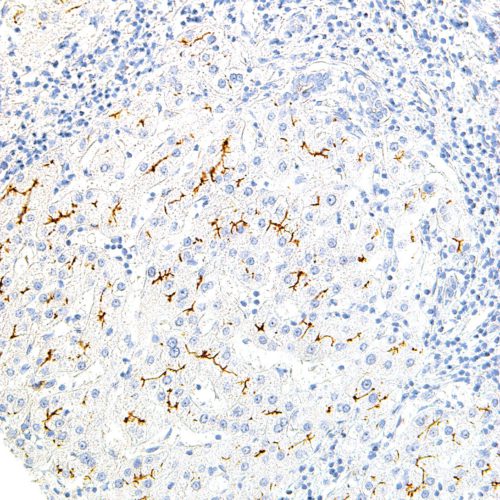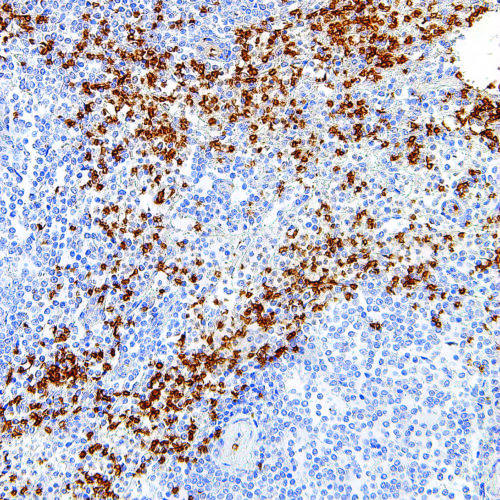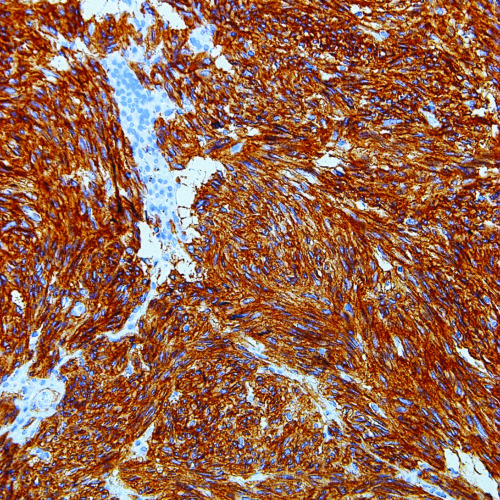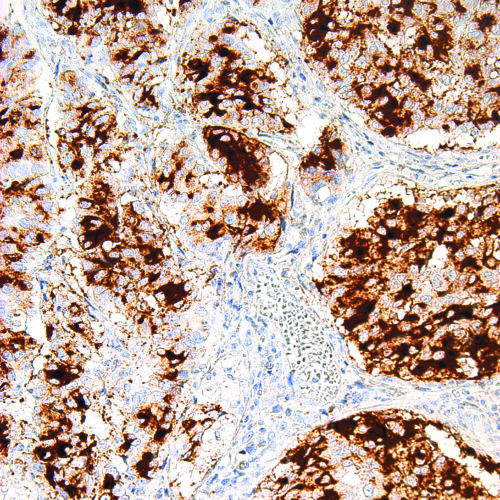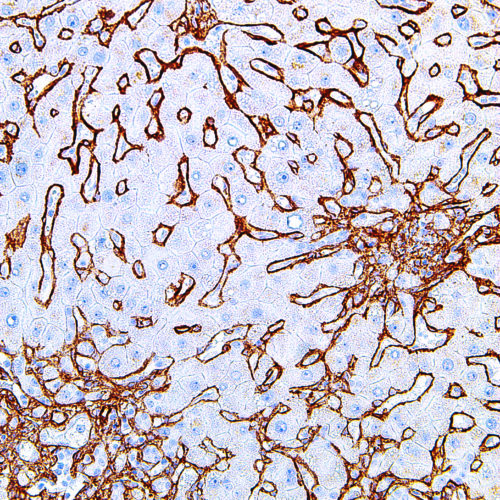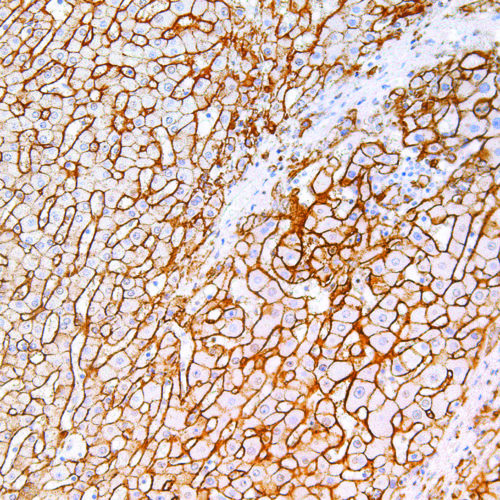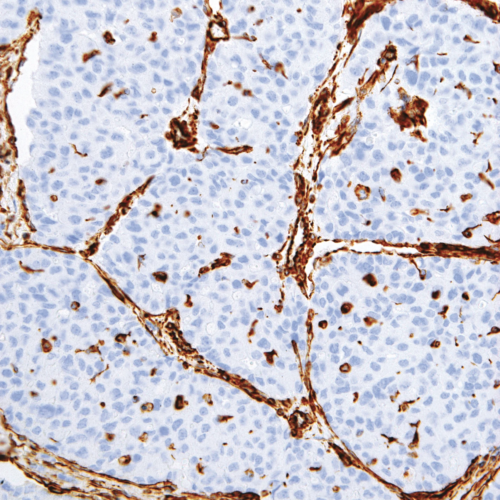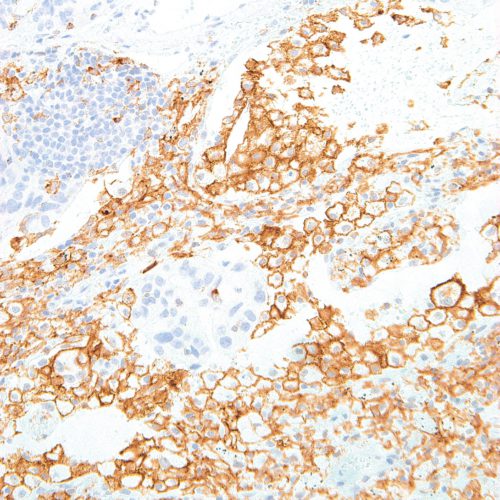High quality products to support Pathologists and Biological and Environmental Scientists
GeneAb™ MDR3
$210.00 – $980.00Multidrug Resistance 3 (MDR3), also known as ATP Binding Cassette Subfamily B Member 4 (ABCB4), is a membrane-associated protein belonging to the superfamily of ATP-binding cassette transporters. MDR3 is an energy-dependent phospholipid efflux translocator that mediates the translocation of phosphatidylcholine across the canalicular membrane of the hepatocyte, and also acts as a positive regulator of biliary lipid secretion. Defects in MDR3 are associated with progressive familial intrahepatic cholestasis type 3 and gallbladder disease type 1. Co-overexpression of MDR3 and MRP1 has been documented as correlating with blastemal subtype and high-risk prognosis of Wilms’ tumor patients.
GeneAb™ Glycophorin A
$80.00 – $215.00Glycophorin A (GPA) and Glycophorin B (GPB) are erythrocyte blood group determinants that minimize erythrocyte aggregation during the circulation of blood. Anti-Glycophorin A is useful for understanding erythroid cell development and identifying erythroid leukemias.
GeneAb™ DOG1
$50.00 – $195.00DOG1, also known as Discovered on GIST-1, is a marker that highly specific for gastrointestinal stromal tumor (GIST). Anti-DOG1 is extremely sensitive for the detection of GIST and its diagnosis. Although some GIST stain weakly for c-kit, DOG1 is expressed in the vast majority of GIST cases. Reports have also indicated DOG1 as a marker for salivary acinar and intercalated duct differentiation.
GeneAb™ BG8, LewisY
$115.00 – $390.00BG8 LewisY, also known as LewisY blood antigen or simply BG8, is a blood group antigen that has been identified in many studies as a potential marker for differentiation between pulmonary adenocarcinoma (PACA) and epithelioid mesothelioma (EM). It has been reported that sensitivity of non-mesothelial antigens for adenocarcinoma is organ-dependent. When attempting to differentiate epithelioid mesothelioma from adenocarcinoma, BG8 LewisY performed at a sensitivity of 98% in the breast cancer group, and 100% in the lung cancer group.
GeneAb™ Collagen Type IV
$85.00 – $340.00Collagen Type IV is a primary component in the basal lamina that is used as a marker to observe the presence of the lamina and examine its structure. In addition to the epithelial basal lamina, Anti-Collagen Type IV stains mesenchymal components. It is useful for identifying soft tissue cancers including schwannomas and leiomyomas. Anti-Collagen Type IV frequently reacts with these tissues after becoming well-differentiated and malignant. The use of Anti-Collagen Type IV produces more reliable results than non-specific silver reticulum stains when investigating the vascular elements of neoplasms, hemangiopericytoma, angiosarcoma and epithelioid hemangioendothelioma.
GeneAb™ CD138
$90.00 – $350.00Cluster of differentiation 138 (CD138), also known as Syndecan-1, is a transmembrane glycoprotein present on the surface of B-cells during late stage differentiation. Anti-CD138 is used to differentiate marginal zone lymphoma from lymphoplasmacytic lymphoma. ALK Large B-Cell Lymphoma (LBCL) commonly stains positively for CD138, but not for CD20 and CD79a. Anti-CD138 reacts positively with HHV8-associated primary effusion lymphoma that lack B-cell markers. CD138 is also a useful marker for identifying and enumerating benign, reactive, or malignant plasma cells from the bone marrow biopsy samples.
GeneAb™ Vimentin
$60.00 – $290.00Vimentin is a component of intermediate filament in mesenchymal cells, such as endothelial cells, fibroblasts, lymphocytes, and melanocytes. Anti-Vimentin is useful for assessing whether tissue samples have been processed and preserved properly. A panel of Anti-Vimentin and Anti-Keratin is useful for differentiating melanomas from large cell lymphomas and undifferentiated carcinomas. This diagnostic grade Vimentin IVD antibody stains melanomas and schwannomas, as well as Endometrial endometrioid adenocarcinomas.
GeneAb™ TIM3
$175.00 – $860.00T-cell Immunoglobulin and Mucin-Domain-Containing Molecule-3 (TIM3) is present on T-helper type 1 lymphocytes and other immune cells including dendritic cells and natural killer cells. TIM3 is overexpressed in CD4 tumor-infiltrating lymphocytes, including those with non-small cell lung cancer associated with poor prognoses. TIM3 has recently emerged as a potential target for cancer immunotherapy.
